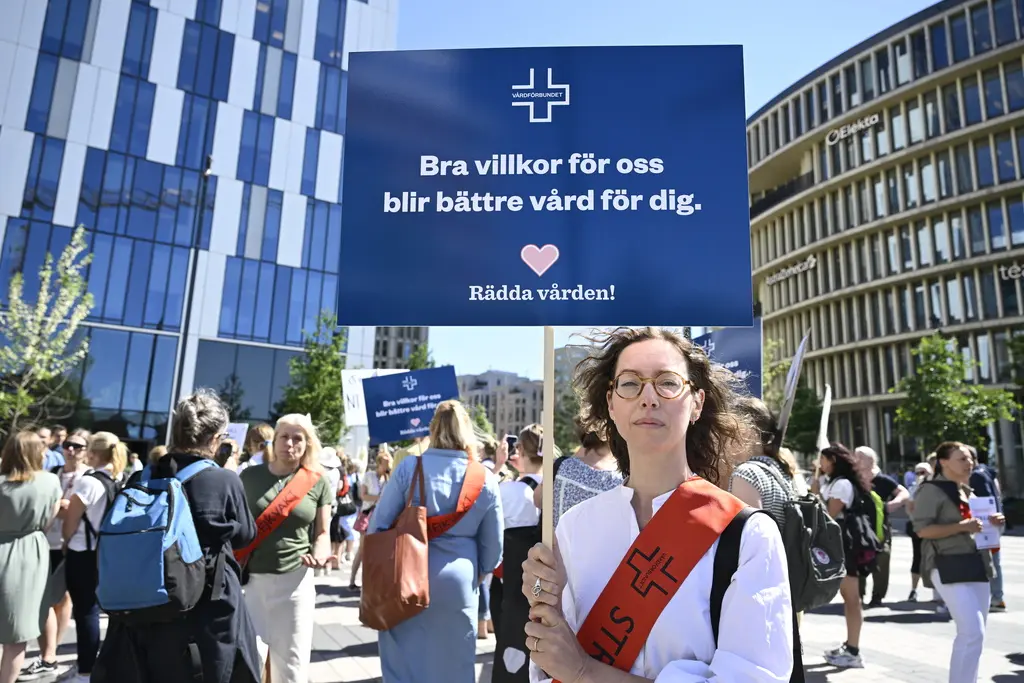Dissatisfaction among nurses is great since the Swedish Association of Health Professionals (Vårdförbundet) signed a new agreement with the Swedish Association of Local Authorities and Regions (SKR). But according to the union, there were no alternatives to the settlement.
The members would have been without a collective agreement for at least six months otherwise, says Annelie Söderberg, chief negotiator at Vårdförbundet.
Last week, the news came that the healthcare strike was over, and that the parties had reached an agreement.
Since then, dissatisfaction among the union's members has been evident, among other things, on Vårdförbundet's Facebook page. Several nurses who TT has spoken to also testify to a great disappointment.
The criticism mainly concerns the fact that only a minority is covered by the working hour reduction.
I don't have a single colleague who is affected by this, says Olga Nilsson, a nurse at Karolinska University Hospital.
I think the agreement is crap. We've fought and struck, and then it's such a bad agreement, says Anastasia Alvbåge, a nurse at Danderyd Hospital.
Few are covered
Of the approximately 78,000 members working within the Swedish Association of Local Authorities and Regions (SKR) and Sobona's agreement area, only about 8-9 percent will receive a working hour reduction. This corresponds to around 6,000-7,000 members. This applies, among other things, to those who work on rotation - i.e., work days, evenings, and nights.
The idea was that 30,000 members would initially receive a 15-minute working hour reduction per day.
I have colleagues who have left the union after this. I'm also afraid that more will choose to leave the profession, continues Olga Nilsson.
The union itself also testifies that there has been great disappointment among members, which they say they understand.
We are not satisfied with the agreement. But it's the employer you should be disappointed with, says Annelie Söderberg, chief negotiator at Vårdförbundet.
"Great risks"
According to the union, the members would have been without a collective agreement for at least six months, and without a revised salary, if they had not accepted the agreement.
We received our last bid from the mediators and SKR. And no new bid would come in at least six months. We can't force them to give us a new bid, continues Söderberg.
It was their way to stop the strike. The alternative would have been not to conclude an agreement, and that would entail all too great risks for the members.
Annelie Söderberg also says that there is still a chance that more can be covered by the working hour reduction. But then you have to be willing to work one night every other week.
The new agreement opens up for a significant working hour reduction then.
A full-time employee who works 40 hours a week in rotation, all days of the week except for public holidays, gets a working hour reduction of between 3 hours and 40 minutes and 5 hours and 40 minutes a week, depending on how much night work they do.
A full-time employee who only works nights, but not on public holidays, gets a working hour reduction of four hours a week, from 40 hours a week to 36 hours.
A full-time employee who works 38 hours and 15 minutes, all days of the week including public holidays, has the opportunity to shorten their working week by almost two hours if they work one night every other week.
Of the approximately 78,000 members working within SKR and Sobona's agreement area, about 8-9 percent will receive a working hour reduction. This corresponds to around 6,000-7,000 members.
Vårdförbundet has a total of 120,000 members.
The agreement applies from June 28, 2024, to March 31, 2025.
Source: Vårdförbundet






